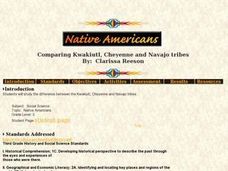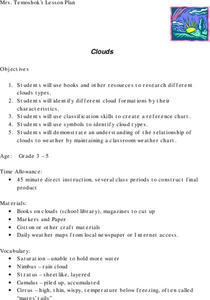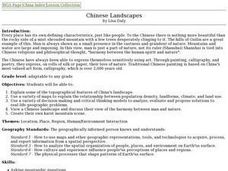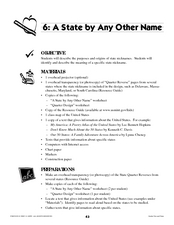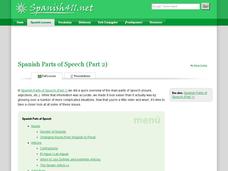PHET
Soda Bottle Magnetometer
Introduce learners to set of complete instructions that describe how to build a magnetometer that works just like the ones professional photographers use to predict auroras. The diagrams are wonderfully descriptive, and the written...
Curated OER
Ancient Egypt
Pupils complete a series of activities to discover life in ancient Egypt. They create want ads for pyramid workers, design vocabulary flash cards and dictionaries, and research famous Egyptians. They also research the "Curse of the...
Curated OER
Comparing Kwakiutl, Cheyenne and Navajo tribes
Third graders study the difference between the Kwakiutl, Cheyenne and Navajo tribes. They identify the people, resources, lifestyle and beliefs of the Kwakiutl, Cheyenne, and Navajo Indians. Afterward, they present their projects on each...
Curated OER
Defining Love
After reading and discussing Love Medicine by Louise Erdrich, pupils compare/contrast the concept/theme of love within several multiple pieces of literature. They must support their claims with textual evidence. In addition, they analyze...
Curated OER
Nonfiction Genre Mini-Unit: Persuasive Writing
Should primary graders have their own computers? Should animals be kept in captivity? Young writers learn how to develop and support a claim in this short unit on persuasive writing.
Advocates for Human Rights
Who are Immigrants?
What do Jerry Yang, Patrick Ewing, John Muir, Charlize Theron, Peter Jennings, and Saint Frances X Cabrini all have in common? They are all immigrants to the United States. Famous and not-so-famous immigrants are the focus of a resource...
Teaching Tolerance
Artistic Expression Showcase
No one is too young to create a masterpiece. Elementary artists delve into the topic of social justice with original artwork. Scholars keep journals to reflect on their experiences before putting paintbrush to paper. Final artwork is...
Curated OER
Basic Math - Plan a Cruise
Learners measure distances and report them in fractions. They convert fractions to decimals and multiply decimals.
Curated OER
Weather and Climate Lesson Plan
Students distinguish between weather and climate and give examples of weather in their town, and examples of climate in their town.
Curated OER
Ocean Influences on Climate Lesson Plan
Students brainstorm about the geographical factors that contribute to climate. They examine the impact of ocean currents on coastal temperatures.
Curated OER
Clouds
Students explore the characteristics of clouds, their formation, symbols used in their identification, and the relationship of clouds to weather. The lesson focuses on how they are formed and their classification.
Curated OER
Beary O'Mometer Learns About Careers In Meteorology
Students explore the field of meteorology. In this meteorology lesson, students explore weather-related careers as they research the field of study as well as various weather concepts. Students interview meteorologists, write business...
Curated OER
Sea Changes: A New England Industry
Students conduct research in order to use primary and secondary sources. They interpret and analyze information from textbooks and nonfiction books for young adults, as well as reference materials, audio and media presentations, oral...
Curated OER
Air Pollution and Asthma (11th Grade)
What is the air quality index? Start by discussing pollution and air quality with your budding environmentalists. A list of instructional activities are provided here from inviting a guest speaker into your classroom to discussing...
Curated OER
Simply Speaking
Emerging orators distinguish between effective and ineffective public speaking strategies. They read a text that fits in with a Native Americans unit and speak about the text with both ineffective and effective volume, tone, phrasing,...
Curated OER
Chinese Landscapes
Students explain some of the topographical features of China's landscape. They view a Chinese landscape and discuss their view of the harmony between man and nature, then create their own karst mountain scene.
Curated OER
Puerto Rico: The 51st State?
Students examine the political status of Puerto Rico. In this global studies lesson, students explore Puerto Rico and consider the feelings of Puerto Ricans regarding their unique political status.
Curated OER
Gallery Walk Questions on Earth's Radiation Balance
Questions that can be used in a lesson on Earth's radiation balance are suggested in this resource. It is not a lesson plan, per se, but it is a list of questions for stations within a "Gallery Walk" lesson. The link to how Gallery Walks...
Curated OER
The Magic School bus Inside A Hurricane
Students investigate the concept of a hurricane by using the cartoon series "The Magic Schoolbus" to simulate the fantasy of traveling through a hurricane. The instructional activity uses a KWL graphic organizer in order to guide student...
Curated OER
Johnny Appleseed
Students engage in a study of apples using children's literature. They conduct research using a variety of resources. Student list facts about apples and compare them while answering some guided questions. They plant some apple seeds and...
Curated OER
Sparta: A Social Experiment
Introduce your class to Sparta - a society that existed during the time of Ancient Greece 700 - 500 BCE. Many aspects of Spartan culture are presented. This includes a most-interesting slide which outlines what it was like to be a child...
Curated OER
A State By Any Other Name
Learning about the fifty states can be motivating. After listening to books, pupils discuss and learn about the nicknames of various states. This is an interesting way to review the locations and characteristics of the states.
Curated OER
Spanish Parts of Speech (Part 2)
Zoom in on a few parts of speech to strengthen and deepen understanding. Pupils examine nouns, articles, adjectives, and conjunctions in closer detail, looking at more complex grammatical situations. In addition to the informational page...
Curated OER
The Alphabet is Historic: The Roman Alphabet is our Alphabet
Students show that the Greeks, Phoenicians and Romans lived in the Mediterranean area. They give reasons why the alphabet was important for the Romans. and say that the Romans developed the alphabet they are learning in school.


